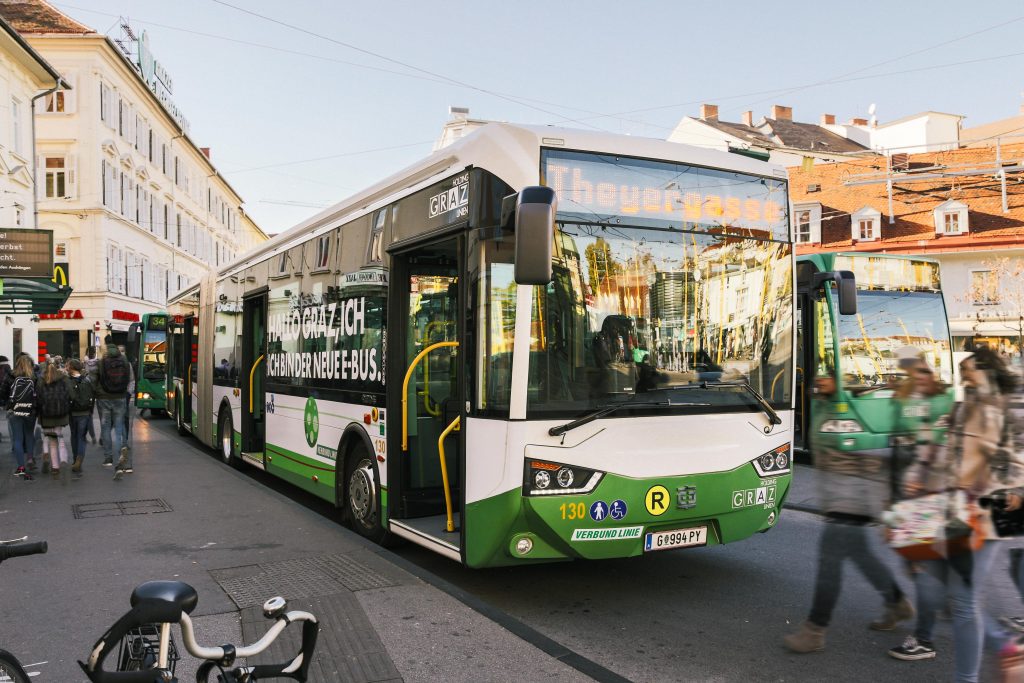E-Bus Consulting
Consulting concerning public transportation services independent of vehicle manufacturers and operators and in-house considerations relating to the implementation of decarbonisation-requirements by the means of introducing of E-buses into operative reality.
From pilot implementation to roll-out until 2030/2050
There is more to the realization of decarbonisation than replacing diesel buses with electro buses and a correspondent alternative acquisition.
Introducing e-buses also indicates a need to redevelop the mobility system in public passenger transport (ÖPNV).
The already mentioned mobility system includes – alongside vehicles equipped with an electrical drive train – for example:
- Supply of vehicles with electrical energy
- Planning of the charging infrastructure for the whole fleet (central or decentral)
- Storage or generation of electrical power directly at the vehicle.
- Optimization of the circuit
What’s more, the mobility system consists of correspondent workshop-resources, as well. They are responsible for the maintenance of a high availability regarding the fulfilment of the passengers’ needs. This ranges from the need to change mechanical resources to electronical and electrical core-technologies to the adjustment in the staff’s competences. This in turn ranges from analytic- and measurement techniques to high voltage training. As a result, new/adapted job profiles (e.g. mechatronics engineer, IT-specialist) are introduced to optimally support electrical drive technology in operations.
There is no “ideal“ solution to implement electro-mobility in a ÖPNV-system.
In each case an individual approach is necessary that has been tested in practice to meet the specific requirements inherent to every different public transport company.
Pilot applications need to be surveyed individually too to expand the knowledge base for a roll-out subsequently by setting up goal-oriented experiences and by building on them. The sustainable design of system solutions requires a mid- to long-term perspective and thereby a consideration of the accompanying risks and chances.
In this process the knowledge of
- The technical status and the development of all relevant technologies concerning vehicles and infrastructure (e.g. thermo management in the field of power storage),
- Standardisation
- Information – and communication technologies (IKT) for system support (e.g. “Internet of Things”), Apps,
- Innovative procurement and funding options and
- Strategies as well as resolutions on the European level (e.g. Green Public Procurement Directives) in support of municipalities and ÖPNV-operators
is a requirement for a future-oriented and sustainable design of the overall system.
In the context of our services the task is considered from all possible angles in accordance with the predefined goals concerning the reorganization of a mobility system.
This way, not only the technological aspects, but also considerations of project design and project work – the latter being implemented together with the client – are depicted. This method comes with both great challenges and chances.
Together with our clients we develop solutions by using a highly structured and analytical approach. To achieve this, we have created tools in a vast array of different projects that support an ideal process for finding solutions and assessing them in a comprehensible and quality-assured way.
The following illustration provides an insight in our tool-based approach, the accompanying analyses and the concepts building on them.

- Lines
- Topology/Profile
- Fleet Structure
- Schedules
- Workshops
- Energy supply
- Climate data
- Ranges
- Rotations
- Energy requirements
- Energetical rotation calculation
- Charging ability
- Syngeries
- Charging scenario ONC/OPC/FC
- Charging efficiency, times and positions
- Rotations development
- Specification
- Vehicle/Charging infrastructure
- Costs (LCC)
- Operational concept
- Schedule
- Location concept
- Charging concept
- Energy supply
- Service concept
- System decisions
Essential results stemming from our procedures are scenarios, programmes and measure-plans in relation to the introduction of electro-buses und the accompanying redesign of the mobility system.
Local conditions, special qualities and external conditions are included and analysed according to the premises of an implementation, optimized regarding the Life-Cycle-Costs (LCC).
This is realized in a proactive cooperation with the client.
Leaning on a risk-based approach, we prepare the foundations of decisions that include assessed options for respective decisions-makers and management boards.
Our objectivity and independence of manufacturers always gives the choice of technologies, system components, concrete vehicles or stationary charging devices to our clients.
Results of a strategy-concept
- System decisions from comparison ONC/OPC/FC
- Lengths and Energy
- Individual rotations and all rotations
- Practicability
- Procurement of charging infrastructure
- Energy supply
- Structures
- Ressources
- Rotation concept
- Vehicle use
- Charging and energy concept
- Building concept
- Service concept

